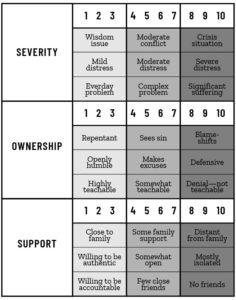
Although Small Group Leaders are not responsible for caring for every need that comes up, you are often the first to know about a situation in your small group members’ lives. The key to caring for them is to ask questions to better understand the situation prior to offering advice or support. Getting the facts and discerning the context for what’s going on is vital for evaluating the next steps.
SOS ASSESSMENT
The following questions are a guide to help you discern when you should come alongside someone in your small group and when a situation might be too much for you to handle on your own. A high score on the SOS Assessment1 is an indicator that you should partner with your coach, pastor or seek additional help from the Soul Care ministry. Ask for permission from your small group member before reaching out for help.Severity: How bad is the problem?
- How difficult is this for you right now?
- How long has this been going on?
- Is it getting better or worse?
Ownership: How teachable is the person?
- How have you contributed to this situation?
- Where have you sought counsel regarding this?
- When was the last time you talked to someone about this? Did you try to implement any of their advice?
Support: Who can help in this situation?
- Do you have godly people helping you?
- Do these people know about this?
- How have they helped you?

WHAT’S NEXT?
Identify the level of care. Use the SOS Assessment to discern the level of care that will be required to help your small group member. This is just a starting point.Get additional input. Ask your Small Group Coach or pastors to help you discern the situation accurately and objectively.
Discern the next step. When dealing with difficult situations, consider these two questions: What’s the main thing and what’s the first thing? The main thing is the root issue that is causing the situation. The first thing is simply the first step to take.
SOS SCORE
After you understand the situation by asking questions related to Severity, Ownership and Support, assign a number that corresponds to the level of care between 1 and 10.Smaller numbers mean the person’s struggle with the problem is probably not life-altering and the Small Group Leader should be equipped to handle the situation on their own. High numbers mean a greater depth of struggle. These are the areas that need the most focus and will likely require additional support beyond the small group.
If the score is between…
3–15 | Seek to provide care within your small group and encourage mutual ministry amongst the group. If additional help or direction is needed, ask your coach for guidance.16–24 | Inform your Small Group Coach and discern if you are equipped to help this person within the group or if they need additional help from the Soul Care ministry.
25–30 | Connect with Soul Care for this level of care and support. In this situation, the role of the small group will shift to become a place of encouragement and prayer.
NEXT STEPS
- Ask the person, ”What do you think is your next step?” Your goal in this question is to evaluate ownership of the situation with the person involved and discern their level of commitment.
- Ask the person, “Would you like me to check on some other resources?” Point them to possible resources that include other people who are available to help but ask them to initiate the call. This might include your Small Group Coach, a pastor or a ministry team at church like Compassion or Soul Care.
1. The SOS Assessment tool is adapted from the leadership training of Garrett Higbee and the book Transforming Small Group Leadership.
